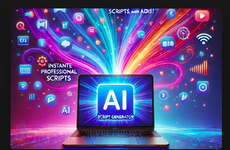
'Sunspring' is a Science Fiction Story Written by an Algorithm
Riley von Niessen — June 13, 2016 — Tech
References: arstechnica & hypebeast
'Sunspring' is the title of a science fiction story written using a computer algorithm that director Oscar Sharp translated into a short film.
The screenplay was created using an algorithm called Jetson, also known as Benjamin, which took a series of science fiction story contest entries and combined them into a (mostly) intelligible screenplay. Oscar Sharp created the film to show how advanced a computer author could be, using his team to analyze the text it created to produce a humorous and rather emotional result.
The science fiction story is set in a future and follows three people in a world where humans are forced to sell their blood, can randomly vomit out eyeballs and can claim that they have to "go to the skull." The film, though often not making a whole lot of sense, has a plot that ends up revolving around an awkward love triangle.
The screenplay was created using an algorithm called Jetson, also known as Benjamin, which took a series of science fiction story contest entries and combined them into a (mostly) intelligible screenplay. Oscar Sharp created the film to show how advanced a computer author could be, using his team to analyze the text it created to produce a humorous and rather emotional result.
The science fiction story is set in a future and follows three people in a world where humans are forced to sell their blood, can randomly vomit out eyeballs and can claim that they have to "go to the skull." The film, though often not making a whole lot of sense, has a plot that ends up revolving around an awkward love triangle.
Trend Themes
1. Algorithm-written Screenplays - Advancements in artificial intelligence technology have opened up opportunities for creating entirely algorithm-generated stories, creating cost- and time-efficient content for movie and TV productions.
2. Automated Film Production - The use of algorithms in creating film scripts could lead to more efficient, cost-effective, and potentially even on-demand film production, catering to an increasing number of streaming platforms and global audiences.
3. AI-assisted Creative Writing - Artificial intelligence technologies can be utilized to ease the burden and expand the creative output of professional writers, from generating content to providing inspiration and enhancing their writing style.
Industry Implications
1. Entertainment - The transformation of film production through AI-generated screenplays and automated production methods could disrupt and transform the entertainment industry, making it more accessible and diverse while reducing costs and improving efficiency.
2. Technology - As AI technologies continue to advance in creative fields, they may disrupt and reshape traditional job roles and working practices, leading to new opportunities for innovative companies in the tech sector.
3. Publishing - AI-generated writing tools can provide new opportunities for publishers and authors alike to efficiently create and monetize content for a growing number of digital publishing platforms, augmenting the writing process and enhancing storytelling abilities.
2.6
Score
Popularity
Activity
Freshness















